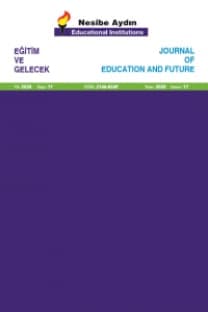The Opinions of Male Pre-school Teacher Candidates on the 104 ir Occupational Preferences: An Analysis in the Context of Gender
Erkek Okul Öncesi Öğretmen Adaylarının Mesleki Tercihlerine İlişkin Görüşleri: Toplumsal Cinsiyet Bağlamında Bir Analiz
___
- Anliak, S., & Şahin Beyazkurk, D. (2008). Career perspectives of male students in early childhood education. Educational Studies, 34(4), 309-317.
- Bayar, Ö. Haskan Avcı, Ö. & Koç, M. (2018). Erkek Toplumsal Cinsiyet Rolü Stresi Ölçeği’nin (ETCRSÖ) geliştirilmesi: Geçerlik ve güvenirlik calismasi-Development of the Masculine Gender Role Stress Scale. Abant İzzet Baysal Üniversitesi Eğitim Fakültesi Dergisi. DOI: 10.17240/aibuefd.2018..-371876 Retrieved from: http://efdergi.ibu.edu.tr/index.php/efdergi/article/view/1890
- Benokraitis, N. V., & Feagin, J. R. (1995). Modern sexism: Blatant, subtle, and covert discrimination. Englewood Clifss, NJ: Prentice Hall.
- Berk, S. K. (2013). Toplumsal cinsiyet ve profesyonelleşme: hukuk mesleğinde kadın örneği- Gender and professionalization: The example of women in the legal profession. Sosyoloji Araştırmaları Dergisi, 16 (1), 75-103.
- Bureau of Labor Statistics (2011). Some occupations becoming more gender neutral. Occupational Outlook Quarterly, 48(4). Retrieved from: http://www.bls.gov/opub/ooq/2004/winter/oochart.pdf
- Cruickshank, V. (2012). Why men choose to be come primary teachers? Australian Association for Research in Education Annual Conference, Sydney. Retrieved from: http://www.aare.edu.au/publications-database.php/6456/why-men-choose- to-become primary-teachers
- Eisler, R.M., Skidmore, J.R., & Ward, C.H. (1988). Masculine gender-role stress: Predictor of anger, anxiety, and health-risk behaviors. J Pers Asses, 52(1):133-41. DOI: 10.1207/s15327752jpa5201_12
- Ersöz, A. G. (1997). Cinsiyet rollerine ilişkin beklenti, tutum, davranışlar ve eşler arası sorumluluk paylaşımı (kamu'da çalışan yönetici kadınlar örneği). (Unpublished PhD dissertation), Hacettepe University, Ankara.
- Europan Trade Union Committee for Education (2012). ETUCE School Leadership Survey: School Leadership in Europe: issues, challenges and opportunities. Retrieved from: https://www.csee-etuce.org/en/documents/publications/143-etuce-school-leadershipsurvey-report-2012
- Kahraman, A.B., Ozansoy Tunçdemir, N., & Özcan, A. (2015). Toplumsal cinsiyet bağlamında hemşirelik bölümünde öğrenim gören erkek öğrencilerin mesleğe yönelik algıları- Profession perseption of male students who study Nursery in context of social gender. Sosyoloji Araştırmaları Dergisi, 18(2), 108-144.
- Kandiyoti, D. (1982). Urban change and women’s roles in Turkey: An overview and evaluation. In, Ç. Kağıtçıbaşı (Ed.), Sex roles, family and community in Turkey. (pp.101-120). Indiana: Indiana University Turkish Studies.
- Kaya, N., Turan, N. & Öztürk, A. (2011). Türkiye’de erkek hemşire imgesi- Men nurse image in Turkey. Uluslararası İnsan Bilimleri Dergisi, 8(1), 16-30.
- Kmec, J. A. (2008). The process of sex segregation in a gender typed field: The case of male nurses. Sociological Perspectives, 51(2), 259-279.
- Küçükkalay, A. M. (1998). Türkiye’de planlı dönemde kadın nüfusu ve kadın işgücü istihdamındaki gelişmeler. Süleyman Demirel Üniversitesi İktisadi ve İdari Bilimler Fakültesi Dergisi, 3, 35–44.
- Lease, S. H. (2003). Testing a model of men’s nontraditional occupational choices. TheCareer Development Quarterly, 51 (3), 244-258.
- Menkel-Meadow, C. (2005). Portiaredux: Anotherlook at gender, feminism, and legal ethics. In, S. D. Carle (Ed.), Lawyers’ ethics and the pursuit of social justice, a critical reader (pp. 274-281). Washington, D.C.: Beard Books.
- Morris, C.G. (2002). Understanding Psychology. (H. B. Ayvaşık & M. Sayıl, trans.) Ankara: Türk Psikologlar Derneği.
- Niles, S. & Harris-Bowlsbey, J. (2013). 21. Yüzyılda kariyer gelişimi müdahaleleri. Korkut Owen, F. (Ed.). Ankara: Nobel.
- Oberhuemer, P., Schreyer, I., & Neuman, M. J. (2010). Professionals in early childhood education and care systems: European profiles and perspectives. Opladen and Farmington Hills: Barbara Budrich Publishers.
- Ökten, Ş. (2009). Toplumsal cinsiyet ve iktidar: Güneydoğu Anadolu Bölgesi’nin toplumsal cinsiyet düzeni- Gender and power: The system of gender in southeastern Anatolia. Uluslararası Sosyal Araştırmalar Dergisi, 2 (8), 302-312.
- Sak, R., Kızılkaya, G., Yılmaz, Y., & Dereli, M. (2015). Çocukların bakış açısıyla erkek ve kadın okul öncesi öğretmenleri- Children’s perspective: Male and female preschool teachers. Sakarya Üniversitesi Eğitim Fakültesi Dergisi, 29, 142-162.
- Schultz, U. (2003). Introduction: Women in theworld’s legal professions: Overviewandsynthesis. In, U. Schultz & G. ShawGisela (Ed.), Women in the world’s legal professions (s. 25-61). Oxford and Portland, Oregon: Hart Publishing.
- Sears, D.O., Taylor, S.E., & Peplau, L.A. (2016). Social Psychology. (A. Dönmez, trans.) Ankara: İmge.
- Smith, J. (2004). Male primary teachers: Disadvantaged or advantaged? Australian Association for Research in Education Conference, Melbourne. Retrieved from: http://www.aare.edu.au/publications-database.php/4487/Male-primary-teachers: Disadvantaged-or-advantaged
- T.C. Milli Eğitim Bakanlığı, İstatistik ve Bilgi Sistemleri Dairesi. (2015). 2015-2016 Milli eğitim istatistikleri: Örgün eğitim. Retrieved from: http://sgb.meb.gov.tr/meb_iys_dosyalar/2016_03/18024009_meb_istatistikleri_orgun_egitim_2015_2016.pdf
- Terzioğlu, F., & Taşkın, L. (2008). Kadının toplumsal rolünün liderlik davranışlarına ve hemşirelik mesleğine yansımaları- Reflections of social gender role on female leadership behavior and nursing profession. Cumhuriyet Üniversitesi Hemşirelik Yüksekokulu Dergisi, 2 (12), 62–67.
- Yıldırım, A., & Şimşek, H. (2013). Sosyal bilimlerde nitel araştırma yöntemleri. İstanbul: Seçkin.
- Zeybekoğlu, Ö. (2013). Toplumsal cinsiyet bağlamında erkeklik olgusu. Ankara: Eğiten Kitap
- ISSN: 2146-8249
- Yayın Aralığı: 1
- Başlangıç: 2012
- Yayıncı: Nesibe Aydın Eğitim Kurumları
Dijital Hikâyelerin Beşinci Sınıf Öğrencilerinin Motivasyonlarına Etkisi
Burcu Sezginsoy ŞEKER, Tuğba TURAN
Özgür ÖZCAN, Erdem TAVUKÇUOĞLU
The Challenges of Refugee Students Encountered in Science Courses: A Phenomenological Study
Türkiye’deki İngilizce Öğretmeni Adaylarının Tekno-pedagojik İçerik Bilgisi ile İlgili Algıları
The Perception of Pedagogical Formation Students have towards Educational Concepts: Metaphoric Study
Eğitim Fakültelerinde Kalite Kültürü Oluşturma Süreçlerine İlişkin Akademik Yönetici Görüşleri
Tuba ** AKAR, Mustafa Cem BABADOĞAN
Erken Okuryazarlık Alanında Türkiye’de Son On Yılın Araştırma Eğilimleri: Tematik Bir İnceleme
Özlem HASKAN-AVCI, Alper KARABABA, Faruk BOZDAĞ, Tolga ZENCİR, Seray Betül ÖZTÜRK*
